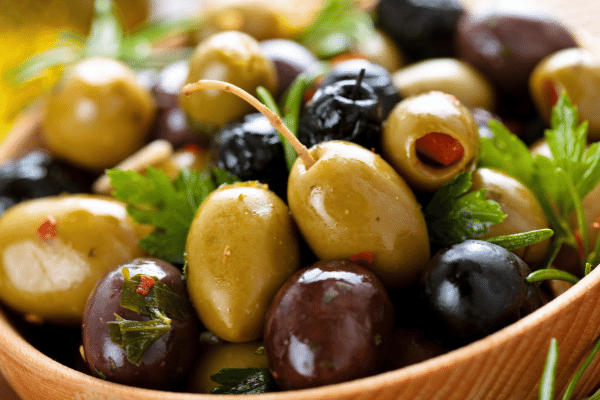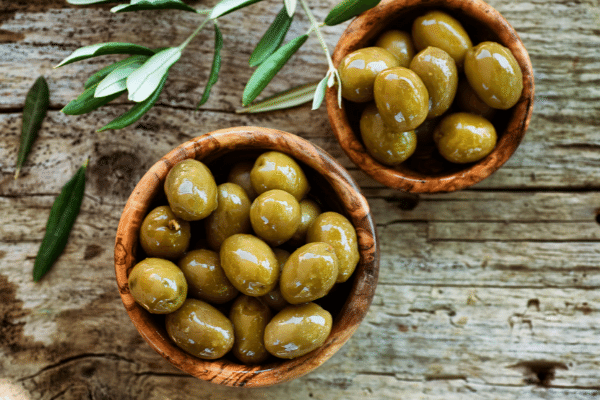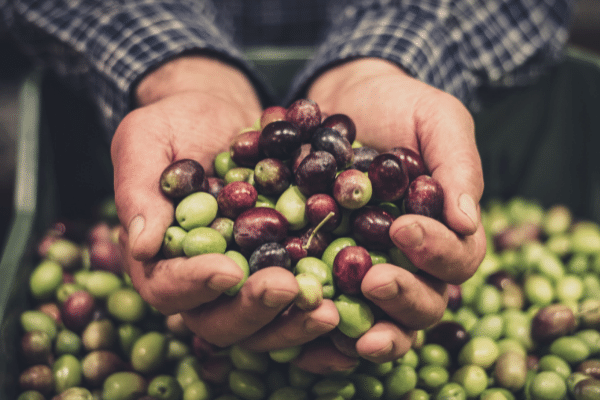
Olives are a versatile ingredient, and you only need a handful of them in most of the recipes, which means there are lots of leftovers.
If you don’t use olives daily in your pizza toppings, pasta dishes, and salads, chances are you have lots of leftovers. So, you may wonder, Do Olives Go Bad?
If you have purchased a full jar or can of olives, it is important to learn the best practices to store them for higher longevity.
Since high-quality olives are expensive, it makes sense to learn if you need to refrigerate them or not, how to store the leftovers, shelf-life, spoilage signs, and more.
What is the Shelf-Life of Olives?
Olives sold in brine always come with a best-before date printed on the label. But, you need to know that olives won’t get bad or change their taste a day, week, or month after the best-before date printed on the label.
The new and sealed jar of olives sustains its peak quality for a couple of months after the best-by date. After opening the jar, it is exposed to air, and hence it starts degrading gradually.
According to Mediterranean Organic, olives must be consumed within 14 days. However, Mezzetta says that the olives sustain their quality for up to a year after opening. Because of such discrimination in estimates, it is challenging to give a single opinion on the shelf-life of olives.
Some research confirms that users must preserve the olives in the low pH brine rather than store them in cool places. But the safe period for consuming the olives is three months after opening.
Please note the olives sold in brine have a shelf-life of 18 months to two years, and the oil-submerged olives have a shorter shelf-life of a couple of months.
| Items | Pantry | Fridge |
| Unopened Olives in Brine | Best-Before Date Plus Three to Six Months | – |
| Opened Olives in Brine | – | Three Weeks |
| Unopened and Opened Olives in Oil | – | Best-By Date Plus Two to Four Weeks |
Please note that these periods are only for the best quality and safe estimates. They are not the expiry date of the Olives.
What are the Spoilage Signs of Olives?

Olives are either sold in brine or oil, and it helps the olives stay fresh and sustain their quality longer. But, it doesn’t mean that olives won’t go bad. But knowing when your olives are no longer edible can be helpful. So, here are a couple of spoilage signs that can help you know when your olives have gone bad and are no longer edible.
Unpleasant Odor
When olives start degrading, it releases off-smell, and it won’t smell new like before. If you notice an unpleasant odor coming from the olives, discard them as they are no longer fresh and safe for consumption.
Change in Appearance
Old and bad olives develop a white substance on their surface. It is not dangerous and can be skimmed off before consumption, as said by Mezzetta.
The white substance on the surface can be off-putting at times, and if this is the case with your olives, you must discard it. The white substances can also be the onset of bacterial or mold growth on olives. So, it is best to discard them.
Change in Texture
To check the texture, it is best to take a bite of the olive and check if the texture is different from fresh olives. If you notice any texture change, discard the olives.
Change in Color
The longer the olives are stored in the brine, the paler it gets. Olives tend to fade away with time, especially when stored in the brine. But, it is not an indication that olives have gone bad. It is fine to consume them, but the freshness would be compromised.
Fresh olives taste, smell, and look fresh and anything less than that is not safe for consumption.
What Happens When You Eat Bad Olives?

Olives sold in oil or brine often stay good and fresh when stored in the original can or jar at any dark and cool place. But, it doesn’t mean that olives have indefinite shelf-life and won’t go bad.
You will risk your health by consuming old or bad olives. Some of the risks of consuming old or bad olives are upset stomach and food poisoning. Bad olives may also cause severe conditions in extreme cases, including dehydration, vomiting, and diarrhea.
Some people may also contract botulism by consuming the old olives stored improperly.
Can You Freeze Olives? Refrigerated Vs. Shelf-Stable

Olives keep their quality and freshness longer when stored properly in a freezer. Freezing the leftover olives is the best way to preserve them before expiry. The sealed and unopened jar of olives in brine can last up to six months when properly frozen.
Olives have higher water content, and hence you must properly store them in a freezer to prevent the freezer burns encouraged by the brine or oil.
So, you must rinse the olives and air-dry the olives with a paper towel before storing them in a freezer. You must use a freezer-friendly container or bag to store the olives. But, ensure to remove the excess air from the container before freezing.
Refrigerated
After opening, you must store the olives in a fridge, whether in brine or oil. If you buy olives in a jar with brine or oil, you can store it in the original jar with a tightly secured lid. Ensure to keep the olives covered with brine or oil as it helps keep them fresh longer.
Olives in a can must be transferred to the food storage container along with the oil and brine before refrigerating. The olives purchased from the grocery store must be stored in a refrigerator to keep them fresh for seven days.
Olives in an opened jar of brine last up to three weeks in a refrigerator.
Shelf-Stable
Olives bought from grocery stores packed in oil and brine must be stored on a pantry shelf up to its best-by date. Ensure that it is stored away from light and heat sources. After opening the jar, it must be transferred to a fridge.
After opening, olives can be left outside for a couple of hours, but they must be returned to the fridge for longevity. Olives must be stored submerged in the brine or oil as it helps them to stay fresh longer.
You must store the olives in an airtight container and keep them submerged in the brine or oil for heightening their shelf-life.
What are the Best Ways to Store Olives?

Knowing the best storage requirements for olives can help you preserve them longer and extend their shelf-life. Since olives are amongst those ingredients that you use sparingly, it is helpful to know how to store them to prolong the freshness. Below are a few common storage tips that every olive user must know.
Store in Dark and Cool Places
The unopened and sealed jar of olives must be stored in dark and cool places, like a pantry or kitchen cabinet. However, it varies between different manufacturers and the conservation process. The unopened jar of olives in brine can keep its quality for years. But, olives in oil have a shorter shelf-life.
Store Well-Sealed
After opening the jar of olives, you must ensure to reseal the leftovers. The jar of the olives must be stored well-sealed and tightly after opening to keep the quality longer.
Keep Olives Submerged in Brine or Oil
After opening, you must reseal the jar and keep the olives submerged into the oil or brine. Keeping them in the brine is necessary as it helps the olives stay fresh until their use-by date. You must not drain the oil or brine after opening.
If you want to transfer the olives in the glass jar for storage, ensure to transfer them along with the brine and keep the jar well-sealed and tightly.
The Bottom Line
Fresh olives can be a delicious addition to any salad or recipe. But, there are specific storage requirements that you must keep in mind to keep your olive fresh longer. You must follow the storage practices mentioned above to keep your olive fresh and tasty up to its best-by date and even a couple of months extra after the best-before date.
Don’t forget to check the spoilage signs in your olives before using them, as consuming bad olives accidentally may cause negative effects on your health.



